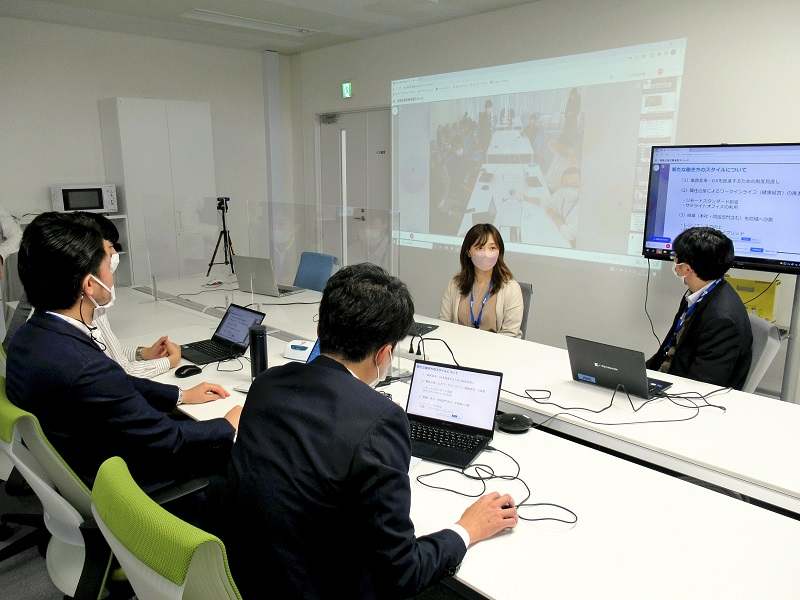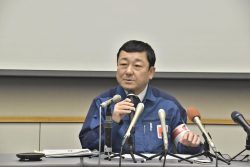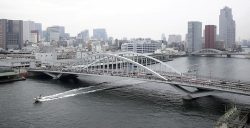
NTT Corp. employees working at different locations hold a video conference in Takasaki, Gunma Prefecture, on Oct. 28.
12:22 JST, December 4, 2022
Thanks to the spread of teleworking during the pandemic, many companies are no longer requiring employees to work at their Tokyo headquarters.
In October this year, NTT Corp. began moving some of the functions of its head office out of Tokyo’s Otemachi district on an experimental basis. Activities such as general affairs and corporate planning, which are primarily conducted internally, began to be shifted to Takasaki, Gunma Prefecture, and Kyoto City.
Yosuke Owada, a section chief in charge of corporate planning at NTT, works almost every day from his home in the Tokyo metropolitan area. Several times a month, he goes to Takasaki and Kyoto by Shinkansen to work at the offices there.
He also uses video conferencing to meet with employees he does usually not see in person.
“I enjoy the abundant nature [in Takasaki and Kyoto] and can work in a different mood,” Owada said.
The transfer of the head office functions is aimed at enabling the company’s operations to continue in the event of a major disaster in Tokyo. Starting this past summer, employees in NTT’s general affairs department and other sections basically telecommute, and can live anywhere they like.
The about 200 employees working at the Takasaki and Kyoto offices were not ordered to move there, and any necessary travel expenses are provided.
Odakyu Electric Railway Co. plans to establish its head office in Ebina, Kanagawa Prefecture, in February 2023, creating another operations base in addition to the one in Tokyo’s Shinjuku Ward.
Of the approximately 800 employees at the head office, about 450 who handle station management and tourism operations along the firm’s railway lines will be transferred to Ebina. The company operates many railway lines in the prefecture, and a spokesperson said the move is aimed at deepening cooperation between staff working in offices and in the field.
Similar moves have been seen in the manufacturing industry.
Craft beer maker Far Yeast Brewing Co. moved its headquarters to the village of Kosuge, Yamanashi Prefecture, from Tokyo’s Shibuya Ward in June last year, a move that it said reduced fixed costs. Employees might have quit if they were asked to relocate due to a corporate transfer, but that didn’t happen thanks to teleworking, the company said.
Some companies are also hoping for increased productivity.
Amuse, Inc., a major entertainment production company based in Shibuya Ward, Tokyo, set up its headquarters in Fujikawaguchiko, Yamanashi Prefecture, where it has a brewery, in July last year in a bid to cultivate employees’ creativity in an environment near Mt. Fuji.
Most of the employees alternate between going to the Tokyo office and working from home, with fewer than 10% of the staff working in an office all the time.
Support from local governments
According to a survey by Teikoku Databank, Ltd., 351 companies moved their head offices and major functions to rural areas from Tokyo and three other prefectures in the metropolitan area in 2021, up 63 from a year earlier and the most since 1990. Osaka, Ibaraki and Hokkaido prefectures were cited as especially popular destinations.
Many local governments have a program to financially assist firms moving their head office functions to their municipalities. The city of Okayama, for example, subsidizes part of the office maintenance cost of companies moving to the city.
The central government has also provided tax breaks for companies that move their head office functions to rural areas, to promote regional revitalization. However, some businesses say it is difficult for them to leave Tokyo, where many people are gathered.
“More companies will move some of their head office functions to rural areas, as the pandemic showed us which jobs can be done by teleworking,” said Keiji Kanda, a senior economist at Daiwa Institute of Research Ltd. “But, there are still advantages to having a head office in the Tokyo metropolitan area, where transportation is convenient and information is gathered.”
Top Articles in Business
-

Japan, Italy to Boost LNG Cooperation; Aimed at Diversifying Japan’s LNG Sources
-

Narita Airport, Startup in Japan Demonstrate Machine to Compress Clothes for Tourists to Prevent People from Abandoning Suitcases
-

Asics Opens Factory for Onitsuka Tiger Brand in Western Japan
-

JR Tokai, Shizuoka Pref. Agree on Water Resources for Maglev Train Construction
-

KDDI Opens AI Data Center at Former Sharp Plant in Osaka Prefecture; Facility Will Provide Google’s Gemini AI Model for Domestic Users
JN ACCESS RANKING
-

Japan Institute to Use Domestic Commercial Optical Lattice Clock to Set Japan Standard Time
-

China Eyes Rare Earth Foothold in Malaysia to Maintain Dominance, Counter Japan, U.S.
-

Man Infected with Measles May Have Come in Contact with Many People in Tokyo, Went to Store, Restaurant Around When Symptoms Emerged
-

Japan, Qatar Ministers Agree on Need for Stable Energy Supplies; Motegi, Qatari Prime Minister Al-Thani Affirm Commitment to Cooperation
-

Australian Woman Dies After Mishap on Ski Lift in Nagano Prefecture























